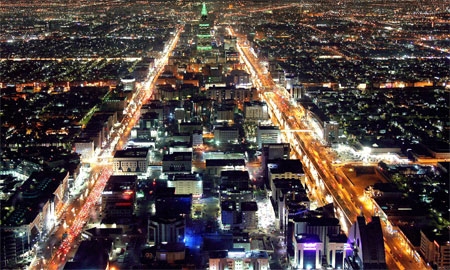Within the Arabian Peninsula, Saudi Arabia is the largest country, and Riyadh the largest city. Riyadh, or Arriyadh, as it is locally known, is experiencing a boom in many ways, from real estate and education to industry, business and finance.
Arriyadh means ‘meadows’ or ‘gardens’ in Arabic - a tribute to the city’s location in one of the few green areas lying in the Arabian desert. Today, it is one of the world’s fastest growing cities, with the developed area expected to double from its current 470 square miles to 965 square miles by 2029. The population, meanwhile, grew at a steady rate of 4% between 2004 and 2010. A high quality of life, combined with the increasing number of businesses opening and expanding in the city (Riyadh’s economy generated 460,000 new jobs between 2007 and 2009 alone), should maintain this rate for years to come.
Businesses that already call Riyadh home include the head offices of Saudi commercial banks, as well as foreign branch banks, including Emirates Bank and Deutsche Bank Group. In addition, Riyadh has been chosen as the headquarters of the Joint Central Gulf Bank, the institution that will supervise the execution of the monetary policy of the Gulf Union.
Yet another project in the financial pipeline that will boost Riyadh’s status further is the King Abdullah Financial District (KAFD), which is set to be one of the biggest world financial centers. The $96 billion KAFD will serve as Saudi Arabia’s gateway to an intellectual economy, facilitating the exchange of technology and knowledge through projects such as Riyadh Techno Valley, Saudi Organization for Industrial Estates and Technology Zones (SOIETZ), and Riyadh Assembly for Communications and IT.
RIYADH IS NOT ONLY SAUDI ARABIA’S POLITICAL CAPITAL, IT IS ALSO A MAJOR CENTER OF INDUSTRY, FINANCE, BUSINESS AND CULTURE
RIYADH IS THE FUTURE HOME OF THE KING ABDULLAH FINANCIAL DISTRICT AND THE JOINT CENTRAL GULF BANK
|
Administrative hubs of large companies - such as Saudi Basic Industries Corp. (SABIC), National Co. for Glass Industries, Yamama Saudi Cement Co., and Saudi Real Estate Co. - are also located in Riyadh, as are two major industrial cities, which are supervised by SOIETZ and collectively host 788 factories. Furthermore, the royal city boasts more than 30 research centers and six major universities.
Riyadh, being the capital of the kingdom and home to a broad scope of diverse institutions, is the financial, business, industrial, cultural, and political center of Saudi Arabia, capable of competing not only on a regional level, but on a global scale.
“The kingdom’s continued focus on infrastructural projects have helped develop the service sector, create economic value and prosperity in the private sector, and attract domestic and foreign investment,” explains Prince Salman Bin Abdul Aziz, Governor of Riyadh.
In 2010, he established the
Riyadh Competitiveness Center (
RCC) to capitalize on the city’s unique advantages and ensure continued economic development in order to fulfill Riyadh’s competitive potential. The company’s four primary goals are to develop sectors and monitor the city’s many clusters, promote and facilitate investment, encourage entrepreneurship and innovation, and evaluate Riyadh’s competitiveness.
The RCC has determined that an enhanced utilization of IT will be the best vehicle to achieve the results and performance it seeks. “We’re in the process of implementing a countrywide system - a type of database - which will contain various sorts of information: financial, economic, supply and demand, forecasts, etc.,” explains Prince Mohammed bin Salman, secretary general of the RCC. “Having constant access to up-to-date, accurate, and credible information will enable executives and managers to make well-informed decisions and ultimately maximize profits and company performance. I am convinced that having optimally performing companies will directly enhance Riyadh’s overall level of competitiveness.”

0 COMMENTS